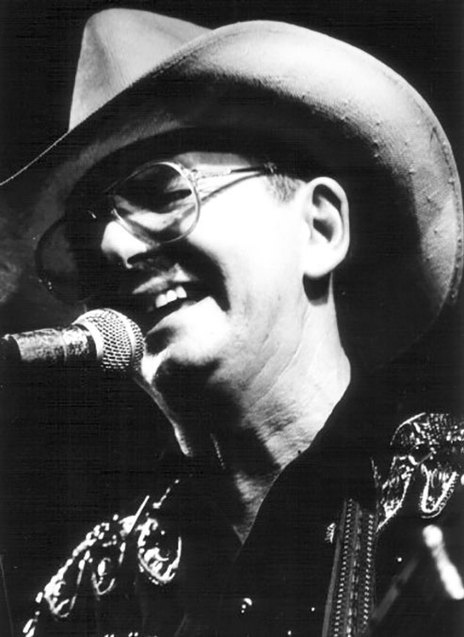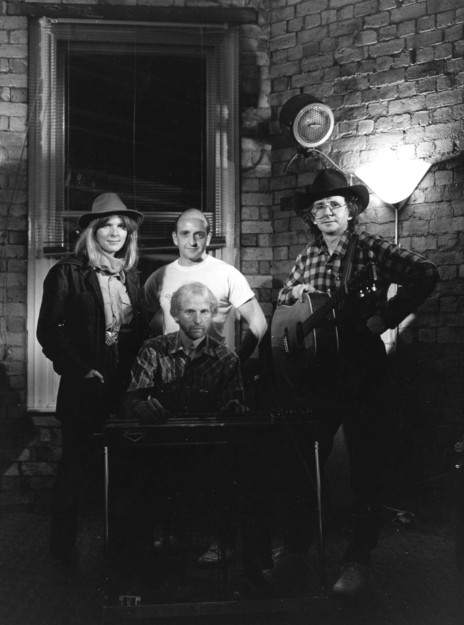Newton, Auckland, 1993 – The man in the big hat is buying. And, as the Jerry Jeff Walker song of that name says, “Drink up, ’cause the drinkin’ is free”. The man in the big hat is Al Hunter, the country-rock singer who, as one friend observed, “tours Auckland several times a week”.

Al Hunter, Auckland, October 1992. - Photo by Alan Fon
The drinks are on Hunter because the previous week, at his Saturday afternoon residency at the Kings Arms, one of the regular punters took the hat around to keep the party going a bit longer. Hunter was slightly embarrassed by the gesture; he would have played on anyway, because although hoe-downs such as this are his livelihood, these revellers are his friends.
Hunter and his crack band of country players have been holding court at the Kings Arms for nearly four years. It’s a nondescript pub, hidden away from the traffic in inner-city Auckland, tucked in among light-industrial warehouses. But, for the diverse crowd, it has become a haven. Drawn by the opportunity to see one of New Zealand’s finest bands, the crowd returns for the convivial atmosphere. The Kings Arms has the spirited, egalitarian air of a rural pub; it’s a unique, clique-free zone in the style-conscious big city.
The scenery can change in a moment, if a bus arrives full of rugby supporters from nearby Eden Park, if the league fans watching TV in the next bar are on a high, if record retailers come by after their shops have closed, if the Harley Davidson enthusiasts roar up – or if it’s their elderly compatriots, the grey-bearded Ulysses club (whose patch reads: grow old disgracefully).
But some of the regulars are as unchanging as the décor. On the dancefloor is a veteran of El Alamein, who must be hitting 80; Baz, the dapper drycleaner; Pete the side-burned rockabilly rebel. Lurking on the edges are Graham, like a lamp-post in the middle of the room, hidden behind Stetson and shades – and Charles Bukowski lookalike, the ubiquitous Dolly Rocker.
It’s a motley crew, but all regard Hunter as a personal friend. He listens patiently to the raves as he mingles between sets. The crowd’s loyalty is rewarded on the sleevenotes of Hunter’s new album, The Singer, which thanks just about every KA regular (even me) for their support.
The spirit each Saturday afternoon has evolved because, says Hunter, the crowd is a cross-section of Auckland’s population. “There’s everybody from wealthy people to poor, Māori to Polynesian to Chinese, old women and young, fat guys and thin … and everybody gets on. There’s no bullshit, everybody’s down to earth and the atmosphere is absolutely great. People have come to this pub to listen to the music and that’s the good thing. Before [our residency] the place was empty.”
“People have come to this pub to listen to the music.”
Country music crosses the audience boundaries because there’s something for everybody, says Hunter. A blues fan can see the blues in Hank Williams, a jazzer can appreciate Bob Wills’s western swing. “But mostly it’s the communication level of country. You don’t talk in riddles, you talk straight. That’s working-class ethics. To me, they’re coal-mining songs. Call them songs from a coal miner.”
Hunter grew up the son of a coal miner, in Pukemiro, a small mining town in the Waikato. He never knew his father, who died when Al was eight months old, but Hunter senior left his son a legacy of music. He played piano in dance bands in the 1940s, driving along back-country roads to play at local halls. “They used to do the whole circuit around the little townships of the mining area: Rotowaro, Glen Massey, all around. Just him and the sax player and the drummer, funny combinations of players. They used to get the people up, boot-skootin’ all over the place.
“My sister, who still lives in Pukemiro, knows about my father. She’s 18 years older than me. She says he’d be very proud of what I’ve done.”

In the late 1980s the Al Hunter Band takes shape in the Shakespeare Tavern, Auckland. From 1989, with Bruce King on drums, they would hold court at the Kings Arms. From left: Cath Newhook, Alastair Dougal, Red McKelvie (front) and Al Hunter. - Simon Grigg collection
Hunter can remember the moment he fell in love with country music. In the mid-50s, at the age of eight, he was sick in bed and listening to the radio when George Jones’s ‘White Lightning’ came on. Jones has been an idol ever since. Fats Domino, Little Richard, The Beatles and The Rolling Stones all got in the way through the 60s, so when he moved to Auckland to become a singer, it was in R&B bands such as Cruise Lane, The Killing Floor and Chapeaux.
In the 70s, Hunter began to drift back to his first love. Playing support for overseas acts such as Leon Russell, and The Amazing Rhythm Aces, helped; so did the emergence of the “outlaw” school of songwriters, who turned their back on Nashville schlock – musicians such as Jerry Jeff Walker, Willie Nelson and Guy Clark. “It took me back to the bare-bones stuff, not the big orchestras with the Anita Kerr backing vocals and all that bullshit. Just plain, ordinary, band playing. Great players and great songs. Just like Hank Williams and that early 50s stuff, which is still incredible.”
About 1980, Hunter made the decision: it was country music from now on. “I’ve been out of fashion for years, doing what I do. But it’s something I’ve had to do, and something I love to do. And I just said about 12 years ago, I’m not going to do anything else but what I love. If I can make a living, I can do this forever – and still be loving it.”
Wearing the big hat in the big city hasn't been easy.
It hasn’t been easy, being the easily identifiable man in the big hat, in the big city where, before the advent of country radio, a touch of country meant Kenny Rogers or Olivia Newton John by the saccharine spoonful. Wearing one of the Stetsons that have become his trademark, Hunter has often stood out in Auckland like Joe Buck in Midnight Cowboy. In the past there was the odd gig where playing country meant dying a death on the bandstand, and he’s had to switch to rock’n’roll. He was even booked to play Auckland’s punk club XS in 1980, and the only person in the audience was the proprietor who’d hired him. “Now, people know what they’re going to get. It’s very seldom that I do a gig now where I’m out of place.”
Country songs are about real lives, says Hunter. ‘The Singer’, the title track of his album, is about his own. It’s the life of the bar-room singer who writes his own songs but survives playing those by other people. He sings requests for all his regulars – even does ‘Happy Birthday’. A woman at the bar knows all the sad ones, a man in the corner complains the music is too loud, a travelling salesman keeps calling for ‘Me and Bobby McGee’.
“I’m learning,” says Hunter of his songwriting. The humility may be typical of a career hampered by a lack of self-promotion, but it’s unjustified. The Singer is full of songs his outlaw heroes would have been proud to write. “It’s taken 20-odd years of actually playing music. I’m learning what makes a good song, and that images are very important – songs are like mini-movies, you can see them in your head. You’ve got to set little scenes and little plots, like any writer. That’s what I’m trying to do.”
The influences may be American – the cowboy novels of Larry McMurtry, the westerns of John Ford – but the settings are those of someone with his roots still west of Hamilton. ‘The River’ is a wide-screen epic about lives on the banks of the Waikato, which “runs through the country like an escapee”. ‘Pukemiro’ is a lament to his tiny hometown: “The mine has closed down, but the sun never sets / In my memory there’s faces, I’ll never forget.”
“I’m trying to make a New Zealand song sound universal. Any author who is asked for advice says, write something about what you know. I’m trying to make it simple, accessible and refer to the land or the nature of the place. In America, they have language they use that’s totally foreign to us. It was only when I went there that I actually understood what some of my favourite songs were about. Yes, I’ve got an obsession for another culture, but I have to write about my life. I may wear a hat, but I’m an amalgamation of many things.”
The Kings Arms turns into an urban honky tonk.
It’s around seven o’clock when the Kings Arms turns into a crowded, friendly, noisy, jumping honky tonk. Al Hunter is going over time and should be heading for his next gig, his early-evening patrons should be heading home for dinner. The Singer has to turn into the Entertainer. “I just stand, sing and sort of … wriggle!” says Hunter. “That’s all I do to entertain. As far as standing there with a bullwhip and cape – I’ll leave that to the cabaret artists.”
But Hunter can whip his Kings Arms friends into a frenzy – and does – almost every week, and people won’t leave until it has happened. At late-night gigs ‘Goodnight Irene’ puts across the message that it’s time, please. At the KA the finale is from the King: Elvis Presley’s ‘One Night With You’. Hunter takes the song back to its raunchy original version, ‘One Night of Sin’.
The moment is like ritualised theatre. Hunter’s drummer, Bruce King, a showband veteran, gives an introductory roll. Alone, Hunter cries, “One ni-i-i-i-ght with you …” The pelvis starts grinding like a K Road stripper. The men laugh, the women swoon, everyone presses toward the dance floor. As expected, Hunter hams up the routine, but his love for the song is sincere.
Sometimes the crowd forces him onto a table top. Tonight he plays James Brown, and drops to his knees at the climax, exhausted. The man in the big hat keeps obliging.
--
On 25 February 2018 Al Hunter played the last hoedown at the Kings Arms, accompanied by Alastair Dougal on bass, Des Hetherington on guitar, and Ricki Hetherington on drums.
--
This article first appeared in the Listener, 17 April 1993, and is republished by permission of the author.